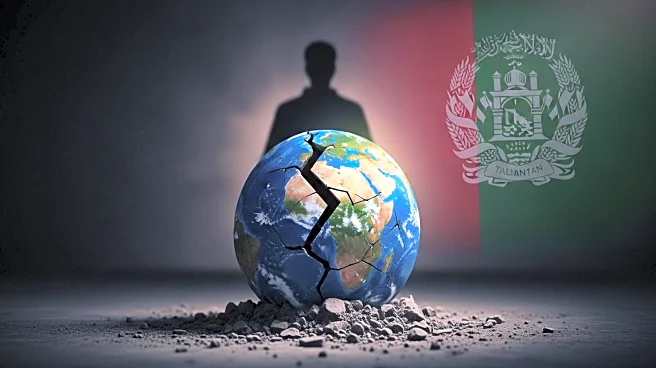What is the story about?
What's Happening?
A magnitude-6 earthquake struck eastern Afghanistan, particularly affecting the provinces near the Pakistan border, including Kunar and Nangarhar. The earthquake, which occurred around midnight, has resulted in at least 800 confirmed deaths and approximately 2,500 injuries, according to Taliban officials. The quake's shallow depth has exacerbated the destruction, causing landslides and flooding in the mountainous region. Rescue efforts are ongoing, but are hindered by blocked roads and difficult terrain. The Taliban government has called for international humanitarian assistance, emphasizing the need for medical aid, rescue equipment, and basic necessities such as food and clean water.
Why It's Important?
The earthquake highlights the vulnerability of Afghanistan, one of the world's poorest countries, to natural disasters. The country's healthcare system, already strained by economic challenges and the withdrawal of foreign aid, is struggling to cope with the influx of casualties. The disaster underscores the urgent need for international support, as Afghanistan grapples with a severe economic crisis and the return of millions of Afghan nationals from neighboring countries. The situation is further complicated by the Taliban's hardline regime, which has led to a significant reduction in foreign assistance. The earthquake's impact on the region's infrastructure and the potential for further aftershocks pose additional challenges for recovery efforts.
What's Next?
The Taliban government is coordinating with international organizations to facilitate rescue and relief operations. China and India have pledged to provide disaster relief assistance, with India already delivering family tents and food supplies. The United Nations is preparing to assist those affected by the quake, while the international community monitors the situation closely. The focus will be on reaching remote villages that have yet to receive aid and addressing the immediate needs of the affected population. Long-term recovery efforts will require substantial international support to rebuild infrastructure and restore essential services.
Beyond the Headlines
The earthquake has brought attention to the broader humanitarian crisis in Afghanistan, where more than half of the population is in need of assistance. The disaster may prompt a reevaluation of international engagement with the Taliban government, as the need for humanitarian aid becomes increasingly urgent. The situation also raises questions about the resilience of Afghanistan's infrastructure and the capacity of its government to respond to future natural disasters. The international community's response to this crisis could have significant implications for Afghanistan's recovery and stability.















